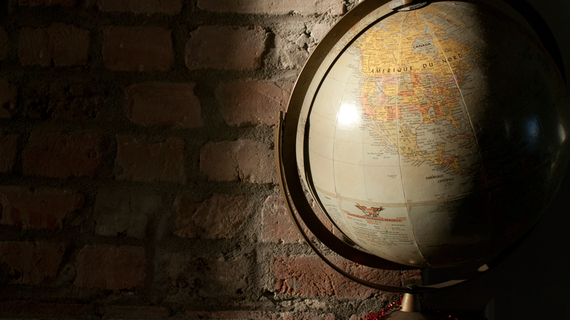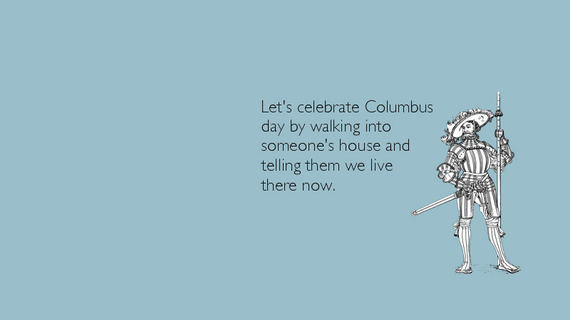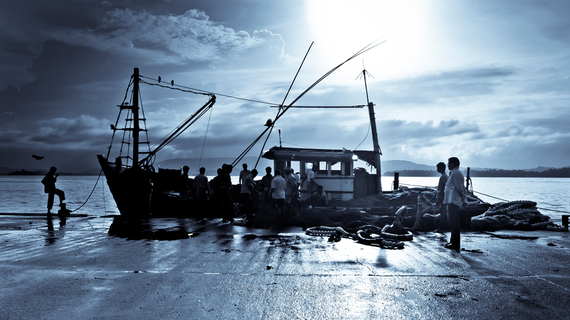I find it confusing that in a nation with so few federal holidays we take a day to celebrate a man responsible for some pretty awful things -- like initiating the transatlantic slave trade and genocide of natives. How in the spherical world did this all come about?
This post originally appeared on Map Happy.
I'm sure we all know about Columbus: the man, the myth, the harsh reality. American children are taught about his courageous journey and "miraculous" discovery since kindergarten. But these days, it's hard to avoid infographics like this cartoon from The Oatmeal depicting how horrible of a person he actually was. (At least that's the type of stuff filling my Facebook feed recently.)
But how did a man who barely managed to find America manage to get a whole holiday unto himself?
In 1892, then-President Benjamin Harrison established Columbus Day to celebrate the 400th anniversary of Columbus' Bahamas discovery. Harrison intended the holiday to be about American pride and patriotism--sticking it in Britain's face how far America had come since 1492--more than Columbus himself and, at that time, Columbus was seen as a symbol of all those great all-American attributes. (It wasn't actually declared a legal federal holiday in the U.S. until 1972 by President Nixon.)
Columbus had already captured the public some 70 years prior. In 1828, Washington Irving published A History of the Life and Voyages of Christoper Columbus to blockbuster, Harry-Potter-esque sales. For whatever reason, Irving depicts Columbus as a generous man who was kind to the indigenous people. NPR states Irving's book "is the source of much of the glorification and myth-making related to Columbus today and is considered highly fictionalized."(That book is also responsible for the falsely historicized idea that most people thought the world was flat pre-Columbus. ) Sooo thanks for all that, Irving!

Good job, Irving. (Christophe / Flickr)
But Harrison and Irving weren't the only ones who had an agenda. There were others who did their part to establish Columbus Day for their own gain, as America's socioeconomic makeup shifted. In the 1890s, the Library of Congress recorded that 600,000 Italian immigrants arrived at Ellis Island, double the amount of the decade prior. By 1900 there would be over two million Italian immigrants. Religious and ethnic discrimination ran rampant. But Christopher Columbus--Cristoforo Colombo, a Catholic man from Genoa, Italy--was Italian. So the Italians clung tightly to their mothers and Cristoforo.
According to NPR, "Many in the [Italian] community saw celebrating the life and accomplishments of Christopher Columbus as a way for Italian Americans to be accepted by the mainstream." At a time when Italian Americans were being ostracized in a xenophobic culture, they made a good point: You all love the guy who discovered ("discovered") this place! Well, he was one of us.
This even extends to the Knights of Columbus, a Catholic fraternal benefit society founded in 1882. In fact, KofC was named after Columbus to drive home the point that Catholics, who along with Italians were also discriminated against, have always been a part of America. What better way to show allegiance to America than by naming an organization after the "discoverer" himself?
The irony in all of this--the one bit of irony in a very ironic holiday and story--is that, now, of course, it's widely believed that Leif Erikson actually was the first European to set foot in America. The Norse Viking is believed to have discovered what is now Canada and Newfoundland 500 years before Columbus. According to the History Channel, explorer Helge Ingstad found possible remains of a settlement in the northernmost point of Newfoundland in 1960. Archaeologists have dated these Viking artifacts to roughly 1000 A.D. and the area is now a UNESCO World Heritage site for its significance.
Obviously, Columbus had the better PR team.
Erikson only has a day of observance on October 9 as of 1954.

Time to hire a new PR firm. (Someecards)
These days, Columbus Day has evolved into a holiday that makes many people feel confused or uncomfortable about what they are "celebrating" (other than a day off work). Several places in the U.S. have replaced Columbus Day with observances and festivities more respectful to indigenous populations. South Dakota and cities in California, Minnesota and Washington celebrate Native American Day or Indigenous Peoples' Day instead. Alaska just took away the entire holiday altogether.
Sure, Americans had already successfully maintained their independence for 400 years when President Harrison marked Columbus Day on the calendar. But "Columbus Day" is really just a term, a propagation of agendas that different people and populations have embraced for their own motives. You decide what to celebrate.
Miranda Ashton is an editorial intern at Map Happy. She is a student at New York University.

